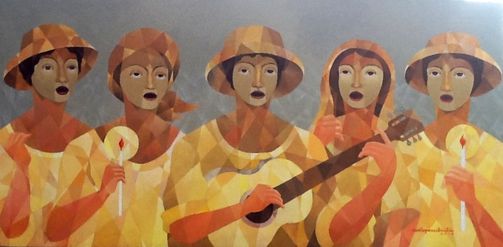“Daun” as Kapampangan calls it, is a commemoration (pamanampang) to the Saints (sablang banal), but before being merged with Christian themes, it’s the ancient offering towards those who died and went on to the afterlife.
Death is not cessation for Kapampangans, but a realization of the self after being freed from his/her earthly life that still continues to live thereafter.
We don’t simply visit the kabusanto (cemetery) because they are dead, but because they are free.
Romantically, it’s only the Kapampangan that have an endearing call for their deceased loved ones- “meangu bie”. The dead does not fade in their death, but goes on toward “bie sumangid” or the afterlife, and this state is far more than the soul being separated from its earthly body, rather it focuses on the “freedom” of the soul from earthly bondage, labor, pain and uncertainty.
Kapampangans have deep meaning and significance for the “meangubie”. The moment a beloved gives his/her final breath (mepatad ne inaua ing tau); that person is not simply dead, affirming the belief “E mapupupus ing sabla potang mate ‘ya” (All does not end upon death), rather, the person will be elevated and peacefully lingers in the “bie sumangid” in his/her fullness.
Meangu-bie is from two words: “angu” which pertains to the act of taking out something (anguan) from a container where the latter is kept for safekeeping. “Bie” evidently is life. Hence in the context of death, the container (lulanan) must pertain to body and earthly life (bie keti sulip) and the soul is the one being taken out (anguan).
Also, “mangaladua” and “panggogosu” or “gosu”, are practices that exhibit joy in the celebration of the afterlife. Call it a Kapampangan version of the western “trick or treat” or “carolling”; apart from the prayers being chanted for the souls. so that it will grant eternal peace to the household of the departed members. Usually, the household then gives money or food to the chanters as a token of gratitude. In the early days, if a household fails to give a token, the singers punish them by stealing chicken from their yard.
Lastly, “pamaniulu neng Daun”, is not simple candle-lighting, for Kapampangans “maniulu” is commutative and distributive, contrast to “suluanan” which is to direct light to someone, “maniulu” meant to light for someone, as a beacon, a guide, a sign of remembrance, or to share perhaps with Hebraic thoughts- relive the breath of the souls of our dearest “meangubie”.
The way fire “api” transcends and becomes light “sulu”, is a gripping narrative of how something that can destroy becomes something that can revive a lost object- like a memory or a presence. Pamaniulu has more mysticism behind its simple act.
Daun literally means offering, hence is a celebration of remembering and giving. Sadly, many of these traditions and deep themes are almost forgotten.
Photo Courtesy: Noel Lopez Catacutan
Source: sinupan.org




